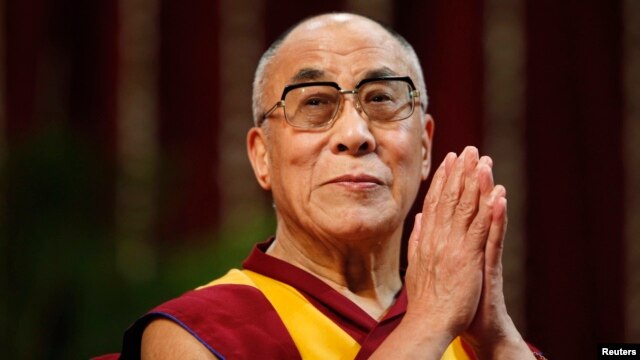
FILE - The Dalai Lama gestures before speaking to students during a talk at Mumbai University.
For Tibetans, December 10 is usually charged with happiness and tension, as security police swarm markets and temples on the lookout for extraordinary displays of religious fervor or celebration.
Their vigilance marks the Dalai Lama's 1989 Nobel Prize anniversary, a day when many Tibetans have the spiritual leader in their thoughts and grapple with the fact of his absence due tightly enforced restrictions on worshiping him in homes and monasteries across ethnically Tibetan areas of China.
That’s why Voice of America’s December 10 satellite TV broadcast of a historic interview [full video available here] with the Dalai Lama was a major news event for Tibetans, with hundreds of clips from the interview shared on Chinese social media. For older Tibetans, it was the first time since 1959 that they had seen the Dalai Lama speaking at such length on issues confronting the Tibetan people.
In the sweeping 80-minute interview recorded in India, the Dalai Lama covered a wide range of topics, including the origins of Tibet’s civilization; the achievements of Tibet’s ancient kings; Tibet’s turning away from war and empire-building to Buddhism and spirituality; and the necessity of preserving and cultivating Tibetan culture because of its value in today’s world.
The Dalai Lama also spoke about the importance of secular ethics, the practice of compassion, and mutual respect between followers of different religions in resolving some of today’s most intransigent conflicts.
“The teachings in religion on kindness and having concern for others is being ignored these days, while at the same time, the sense of one’s own religion is becoming more and more self-centered, combining to create chauvinistic ideas on the superiority of one’s own religion, thus one’s own superiority," he said. "It is this mindset that is creating problems today.”
And in turning to China, he expressed the view that religions in general have the potential to bring a degree of peace to people, and that Tibetan Buddhism, which has enjoyed wide respect and influence throughout the last 1,000 years of Chinese history, can help resolve many of China’s societal, environmental, and political problems.
“For a future People’s Republic of China to experience prolonged stability, for the people to feel contentment, and for the nation to enjoy wide influence in this world, compassion, tolerance, and a wider perspective, are essential. And not being driven by narrow insecurities,” he said.
The Dalai Lama concluded his remarks by turning directly to the camera to urge Tibetans to improve their own economic well-being and education, and to value and protect culture by stating that, “It is up to Tibetans to protect our culture, not for our sake only, but because Tibetan culture has the potential to contribute enormously to the future well-being of all people on earth.”
For Tibetans, this December 10 was charged with the typical blend of happiness and tension, but the appearance of numerous blurry images of a Tibetan TV screen lit up with the Dalai Lama's face may have shifted the balance a little more to the happy side. |
|
